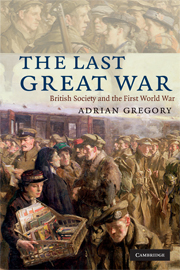Book contents
- Frontmatter
- Contents
- Illustrations
- Acknowledgements
- Introduction: The war that did not end all wars
- 1 Going to war
- 2 Defining the enemy: Atrocities and propaganda 1914–1915
- 3 From spectatorship to participation; From volunteering to compulsion 1914–1916
- 4 Economies of sacrifice
- 5 Redemption through war: Religion and the languages of sacrifice
- 6 The conditional sacrifices of labour 1915–1918
- 7 Struggling to victory 1917–1918
- 8 The last war?
- Conclusion
- Notes
- Index
Introduction: The war that did not end all wars
Published online by Cambridge University Press: 05 June 2014
- Frontmatter
- Contents
- Illustrations
- Acknowledgements
- Introduction: The war that did not end all wars
- 1 Going to war
- 2 Defining the enemy: Atrocities and propaganda 1914–1915
- 3 From spectatorship to participation; From volunteering to compulsion 1914–1916
- 4 Economies of sacrifice
- 5 Redemption through war: Religion and the languages of sacrifice
- 6 The conditional sacrifices of labour 1915–1918
- 7 Struggling to victory 1917–1918
- 8 The last war?
- Conclusion
- Notes
- Index
Summary
Popular memory and historical understanding
The British still seem to take the First World War personally. It would be difficult to imagine a contemporary British historian of the Napoleonic Wars writing a preface about how their great-great-great-grandfather died of typhoid at Walcheren or lost an arm at Badajoz, but it seems almost instinctive to evoke a grandfather at Loos or a great-uncle on the Somme. Moral indignation is not without benefits for a historian; the crimes and follies of mankind do require something other than cold detachment. But history demands perspective, and intense personal involvement can and does lead to distortion.
Hindsight has been the other curse of writing about the war. Of course, it would be absurd to banish hindsight from our historical judgement. It is one of our assets. We know how things turned out and can therefore attempt to explain why they turned out as they did. But hindsight carries risks when applied to understanding the thoughts and actions of people in the past.
We must remember that hindsight is unavailable to those who are living through the experience, and it cannot inform their decisions. We might choose to condemn the First World War as a human tragedy and an error of colossal proportions, but in doing so we must be aware that there is something essentially anachronistic about this. It can lead to unjustifiable wishful thinking based on little more than romantic nostalgia.
- Type
- Chapter
- Information
- The Last Great WarBritish Society and the First World War, pp. 1 - 8Publisher: Cambridge University PressPrint publication year: 2008



